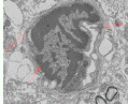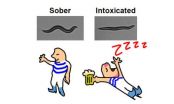Zhichan decoction increases dopaminergic neurons from transplanted NSCs in PD
2014-07-16
(Press-News.org) There is an increasing interest in Parkinson's disease (PD) treatment by increasing dopamine content and reducing dopaminergic metabolites in the brain. Xuming Yang, Shanghai Municipal Hospital of Traditional Chinese Medicine, China and his team detected dopamine content and dopaminergic metabolites in the midbrain of PD rats, which were treated by neural stem cell (NSC) transplantation and Zhichan decoction administration, using high-performance liquid chromatography, and determined global optimization of dihydroxyphenylacetic acid and homovanillic acid levels using genetic algorithm. Results showed that NSC transplantation and Zhichan decoction administration increased dihydroxyphenylacetic acid levels up to 10-fold, while NSC transplantation alone resulted in a 3-fold increment. Homovanillic acid levels showed no apparent change. These findings indicate that after NSC transplantation in PD rats, Zhichan decoction can promote differentiation of NSCs into dopaminergic neurons. Related results were published in Neural Regeneration Research (Vol. 9, No. 9, 2014).
INFORMATION:
Article: " Zhichan decoction induces differentiation of dopaminergic neurons in Parkinson's disease rats after neural stem cell transplantation," by Huifen Shi1, Jie Song2, Xuming Yang3 (1 Department of Neurology, Shanghai Municipal Hospital of Traditional Chinese Medicine, Shanghai, China; 2 Department of Encephalopathy, Liu'an Hospital of Traditional Chinese Medicine, Liu'an, Anhui Province, China; 3 College of Acupuncture and Massage, Shanghai University of Traditional Chinese Medicine, Shanghai, China)
Shi HF, Song J, Yang XM. Zhichan decoction induces differentiation of dopaminergic neurons in Parkinson's disease rats after neural stem cell transplantation. Neural Regen Res. 2014;9(9):931-936.
Contact: Meng Zhao
eic@nrren.org
86-138-049-98773
Neural Regeneration Research
http://www.nrronline.org/
ELSE PRESS RELEASES FROM THIS DATE:
Chrysophanol attenuates injury to hippocampal neurons in lead-exposed neonatal mice
2014-07-16
Previous studies have shown that chrysophanol protects against learning and memory impairments in lead-exposed adult mice. Ji Zhang, Hebei North University, China, proposed a hypothesis that chrysophanol can alleviate learning and memory dysfunction and hippocampal injury in lead-exposed neonatal mice. Results showed that chrysophanol alleviated hippocampal neuronal cytoplasmic edema, promoted mitochondrial crista fusion, significantly improved learning and memory abilities, decreased lead content in blood, brain, heart, spleen, liver and kidney, increased superoxide dismutase ...
Donating a kidney may make it difficult to change or initiate life and health insurance
2014-07-16
People who selflessly step up and donate a kidney can face insurance challenges afterwards, despite the lack of evidence that they have increased health risks. The finding, which comes from a new study published in the American Journal of Transplantation, suggests that actions by insurers may create unnecessary burden and stress for those choosing to donate and could negatively impact the likelihood of live kidney donation.
The impact of kidney donation on the ability to change or initiate health or life insurance following donation is unknown. To investigate, Dorry ...
Live kidney donors face 'pointless' insurance troubles
2014-07-16
Healthy living kidney donors often face pointless post-donation hurdles when seeking or changing health or life insurance, according to results of a new study by Johns Hopkins researchers.
"Living donors are some of the healthiest people in the United States. They're heavily screened before they're approved for donation and should be easily insurable," says study leader Dorry Segev, M.D., Ph.D., M.H.S., an associate professor of surgery and epidemiology at The Johns Hopkins University.
Under terms of the Patient Protection and Affordable Care Act (ACA), health insurance ...
New knowledge about the brain's effective bouncer
2014-07-16
Research from the University of Copenhagen is shedding new light on the brain's complicated barrier tissue. The blood-brain barrier is an effective barrier which protects the brain, but which at the same time makes it difficult to treat diseases such as Alzheimer's. In an in vitro blood-brain barrier, researchers can recreate the brain's transport processes for the benefit of the development of new pharmaceuticals for the brain. The new research findings are published in the AAPS Journal.
Ninety-five per cent of all tested pharmacological agents for treating brain disorders ...
Marijuana dependence alters the brain's response to drug paraphernalia
2014-07-16
New research from The University of Texas at Dallas demonstrates that drug paraphernalia triggers the reward areas of the brain differently in dependent and non-dependent marijuana users.
The study, published July 1 in Drug and Alcohol Dependence, demonstrated that different areas of the brain activated when dependent and non-dependent users were exposed to drug-related cues.
The 2012 National Survey on Drug Use and Health shows marijuana is the most widely used illicit drug in the United States. According to a 2013 survey from the Pew Research Center, 48 percent of ...
Dodos and spotted green pigeons are descendants of an island hopping bird
2014-07-16
The mysterious spotted green pigeon (Caloenas maculata) was a relative of the dodo, according to scientists who have examined its genetic make-up. The authors say their results, published in the open access journal BMC Evolutionary Biology, support a theory that both birds are descended from 'island hopping' ancestors.
The only known example of the spotted green pigeon is the Liverpool pigeon, which is currently in the World Museum, Liverpool. The only other known specimen has been lost, and there are no records of the bird in the wild. There is no record of where the ...
Patients at highest risk of suicide in first 2 weeks after leaving hospital
2014-07-16
Mental health patients are at their highest risk of dying by suicide in the first two weeks after leaving hospital - a report out today shows.
Around 3,225 patients died by suicide in the UK within the first three months of their discharge from hospital – 18% of all patient suicides, between 2002-2012.
The University of Manchester's National Confidential Inquiry into Suicide and Homicide by People with Mental Illness found that 526 patients died within the first week, the peak time of risk in England, Northern Ireland and Scotland; it is the first two weeks in Wales. ...
Underlying cause of cerebral palsy could lie in family links
2014-07-16
This is the first study to investigate cerebral palsy over such a broad range of family relationships.
Cerebral palsy is the most common cause of physical disability in children, affecting approximately two in 1,000 live births in the developed world (and many more elsewhere). It originates from damage to the 'immature' brain and several risk factors in pregnancy have been identified such as preterm delivery, abnormal growth, exposure to infection and lack of oxygen at birth.
Previous studies have found a possible family link with cerebral palsy, but positive findings ...
Is it time to lock up those who commit research fraud?
2014-07-16
Dr Zulfiqar Bhutta, Robert Harding Chair in global child health and policy and Co-Director of the Centre for Global Child Health at the Hospital for Sick Children, Toronto believes that criminal sanctions are necessary to deter growing research misconduct.
He says the fact that research fraud is common is no longer news, but a review by PubMed in 2012 found that 67% of research article retractions were "attributable to scientific misconduct, including fraud or suspected fraud".
Dr Bhutta says the consequences of research fraud on human health can be "huge" and that ...
Mutation stops worms from getting drunk
2014-07-16
Neuroscientists at The University of Texas at Austin have generated mutant worms that do not get intoxicated by alcohol, a result that could lead to new drugs to treat the symptoms of people going through alcohol withdrawal.
The scientists accomplished this feat by inserting a modified human alcohol target into the worms, as reported this week in The Journal of Neuroscience.
"This is the first example of altering a human alcohol target to prevent intoxication in an animal," says corresponding author, Jon Pierce-Shimomura, assistant professor in the university's College ...


